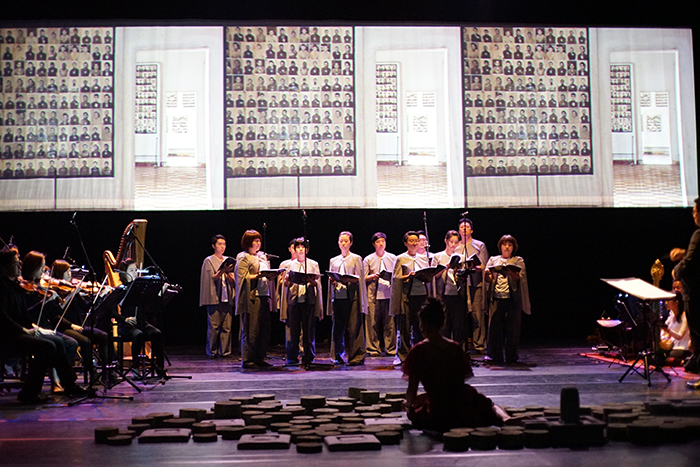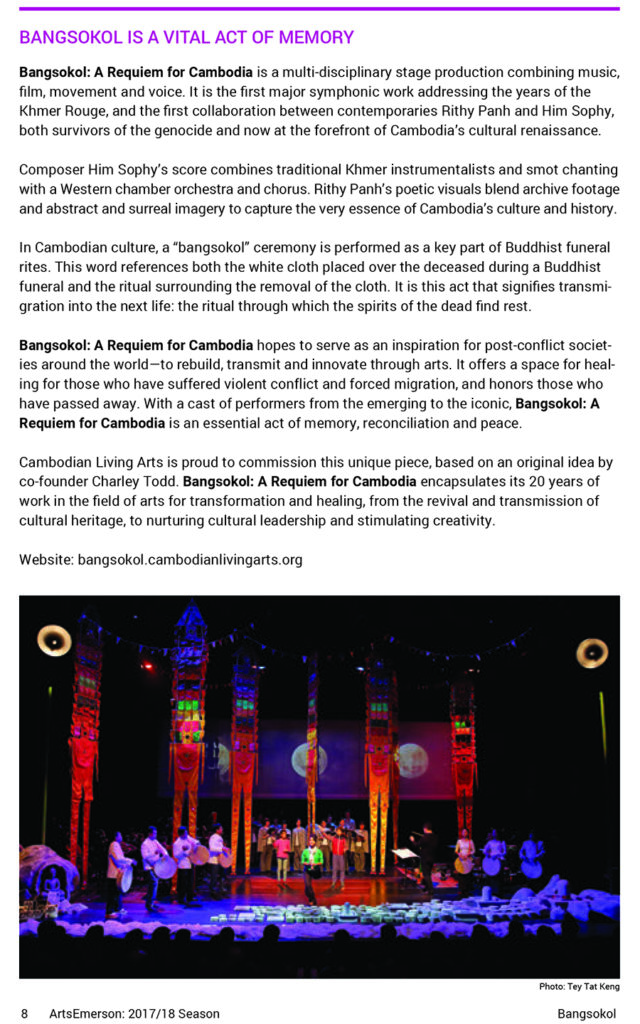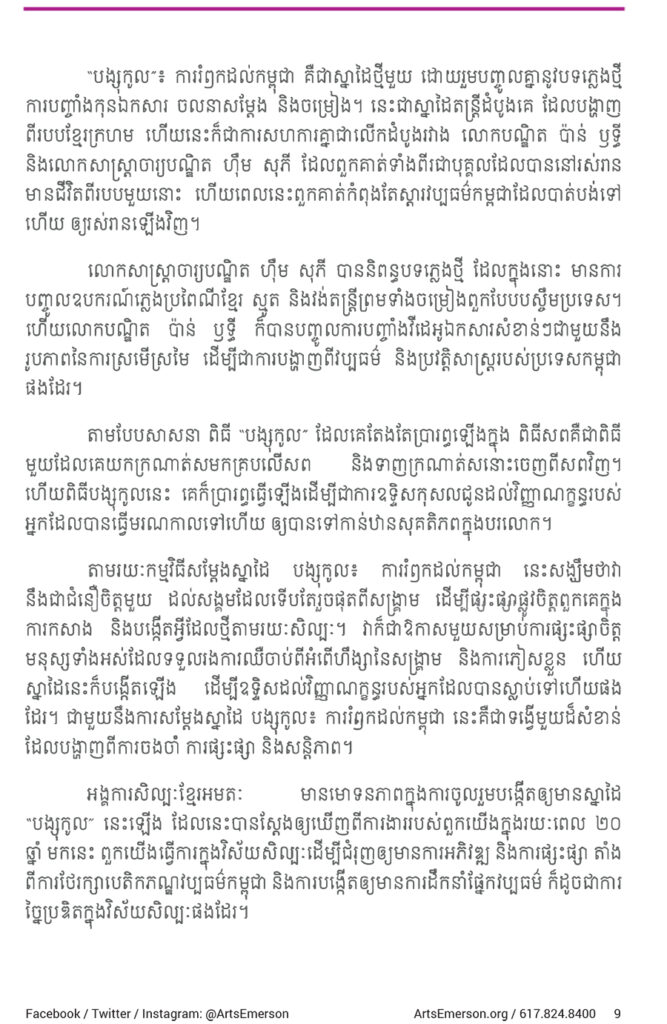Share This:
December 10, 2020 | General, Theatre,
Brushing Up on Bangsokol’s Libretto

In response to the challenges and realities of 2020, Cambodian Living Arts and ArtsEmerson are presenting Arts & Healing: Bangsokol Virtual Festival from DEC 11 – 20. The program is inspired by the groundbreaking multi-disciplinary production, Bangsokol: A Requiem for Cambodia, which seeks to honor victims of violence and explore the healing, hope and resilience of survivors. Whether you’re watching the gala performance of Bangsokol or any of the festival’s related programming, we think you’ll find this summary of the libretto and our older blog content about the show both interesting and informative!
BANGSOKOL LIBRETTO SUMMARY
The libretto for Bangsokol: A Requiem for Cambodia follows the Western classical tradition of putting liturgical texts for the dead to music. Unlike the received European convention of using the Catholic Requiem Mass for the main text, however, Bangsokol: A Requiem for Cambodia is based on the Khmer Buddhist bangsokol liturgy for the dead. This collection of texts in the sacred Pali language used in Cambodia for funerals and memorial rites is similar to those used in other Theravāda Buddhist countries. In addition to these common Buddhist texts, Bangsokol: A Requiem for Cambodia incorporates uniquely Cambodian texts in the Khmer language to create a complete, five-movement liturgical narrative that invokes a countryside funeral, extends into a remembrance of the horrors of the Khmer Rouge period, and culminates with the central rite for the Buddhist dead and prayers for all beings.
The Khmer word bangsokol derives from the Pali paṃsukūla. This term originally referred to the pieces of cloth recovered from corpses by Buddhist monastics to make their patchwork robes. Numerous ritual practices mimicking this early Indian Buddhist practice have persisted in Cambodia. At a Cambodian Buddhist funeral, a white cloth is placed over the deceased; this cloth is then slowly removed by a monk at the height of the ritual. The bangsokol is more than just a cloth; it stands in for the skin of the dead and ultimately represents the womb that leads to new life. The removal of the bangsokol cloth represents the final gift of the dead to those who remain in this world and the formation of their new body for the next life. For Cambodian Buddhists, it is the bangsokol ritual that gives rest (Latin requiem) to the dead.
The six Pali texts used in Bangsokol: A Requiem for Cambodia can be found in numerous Cambodian publications along with their translations into Khmer. “Lullaby for a Funeral” is transcribed from a kong skor (a form of funeral music) performance, while “Stirring Teachings” and the “The Three Marks of Life” are common in Cambodian smot (a form of melodic chant) performances. Finally, “Victorious April 17th” and “Khmer Rouge Slogans” can be found in the work of Henri LOCARD. The Pali and Khmer sources have been selected, edited, and translated into English by Trent WALKER.
Summary of the Libretto
1. wandering souls / utterly alone Alas, my souls, still you wander, ever and always drifting, floating, back and forth, here and there, aimlessly dreaming, walking like ghosts in search of rebirth. My dear souls, come here with grace and build this bridge to cross over the worlds. Your last life was miserable, completely undeserved, dying apart from your siblings, utterly alone.
2. please come listen / the roots of wars Deities of all directions! Please come listen to the great teachings of the Buddha, which analyze the realms and beings of the three worlds so as to illuminate how the minds of humans are filled with greed, along with anger and delusion, the roots of wars and vicious conflicts, dropping all bombs of annihilation.
3. my dearest, my child / they’ve snatched you away Oh, that time, that time in the past! I shall always remember, and never forget when I left my home to walk far away, and shovel and haul earth in a faraway land, far from my child. I search for you, little one, but can’t find you anywhere. I’m cleft from you, child, separated from my family. I search for you, love. In what realm are you now? My dearest, my child! They’ve snatched you away. You cry in longing, split from your kin. You’ve gone far away to a silent place.
4. keeping you is no gain / losing you is no loss Oh, that time, that time in the past! Soldiers and troops threatened and menaced both us and those around us, nearly ruining our ears with thundering voices and deafening sounds, barking like dogs: “Keep your neck up high, if you want to survive! The Khmer Rouge has eyes everywhere, like a pineapple! Keeping you is no gain, losing you is no loss! To dig up the grass, we must dig up the roots!”
5. in the silence of the forest / you’ll be thrown away In the silence of the forest, with none to trust, you’ll be alone, with wild beasts who grunt and groan—there you’ll be thrown away too. Your wealth, the worst poverty; you can’t take anything with you. You’ll lie there like an old shoe— the body’s truly empty. Your merit gone in your wake, they will come take your carcass to the woods cloaked in darkness. You’ll lie useless; they’ll go home.
6. awaiting ambrosia / for all the souls Oh, that time, that time in the past! It was as if we were hungry spirits, lacking food, lacking satisfaction, hungry and near death, with no proper farming taking place in our realm, as we searched and scoured for the nourishment necessary for life, hoping only that friends and relatives would toss out morsels to us who suffered in the realm of the shadows, awaiting ambrosia from lovely worlds above that would stream out everywhere, for all the souls.
7. the white bangsokol shroud / once this skin is shed, bliss arises The white bangsokol shroud lays upon everyone’s body. A monastic of virtue may roll it up to make it into a robe, intoning thus: “How transient the elements of life! Their nature is just to arise and pass away. Having emerged, they soon disappear. Their complete cessation is peace.” Once this skin is shed, bliss arises, relieving all pain and pollution, taking you far away from misfortune to tread the path towards happiness.
8. this body is pain / let it all go This body is pain! Oh pain, great pain, beyond measure. Small pain, great pain, pain boils within. Without relief, pain leads to death. Impermanent! Not long, not long at all, how transient! Once dead, just your foul corpse remains. Flesh, bone, sinew turn into earth. No self ! Nothing, no form, no name, no consciousness, no fame, no rank, no splendor or vitality, all wealth destroyed. So reflect well; care for your heart, calm your anger, your heart soft like mother and child. Calm your anger, let it all go.
9. wandering souls / coming back to life Alas, my souls, stop your wandering! Let go of this sadness and strife. Walk forward, come here, follow the sounds, the sounds of music, to take rebirth. My dear souls, come here with grace and build this bridge to cross over the worlds. Your next birth will be fortunate, completely just, dancing with your siblings, coming back to life.
Below, find two pages from the program of the original presentation of Bangsokol in 2017 in both English and Khmer.






Please continue culturally diverse programming like this in reflecting Boston’s growing cultural richness! Thank you.